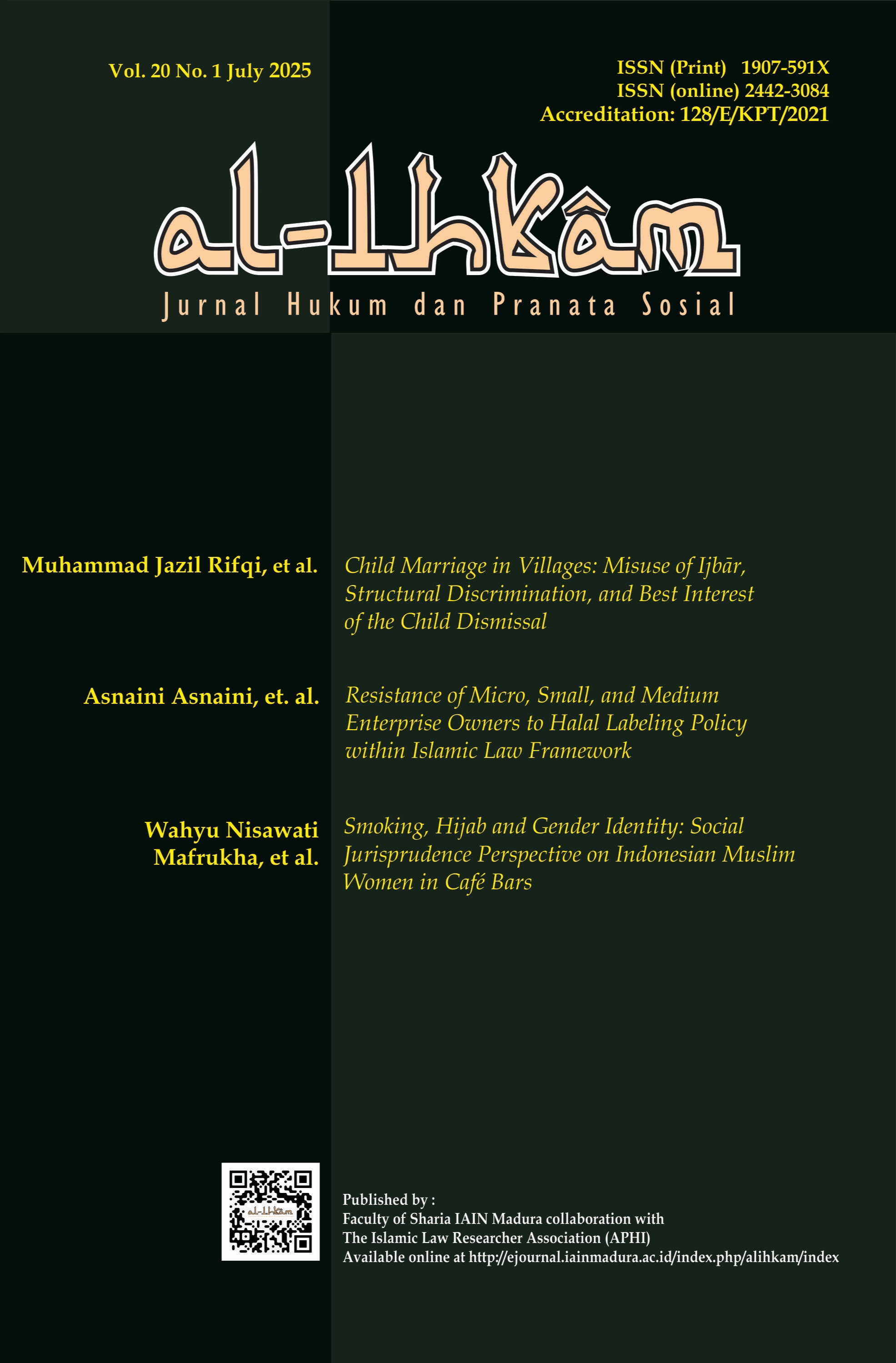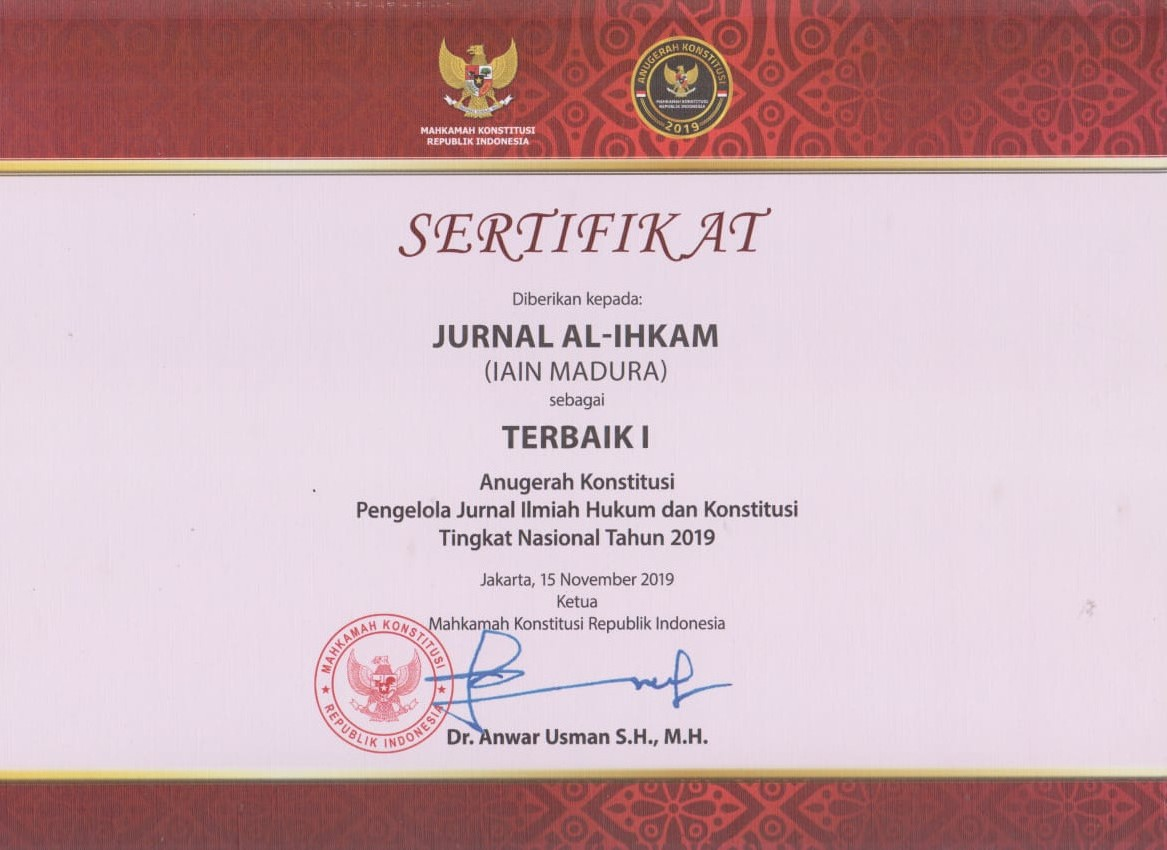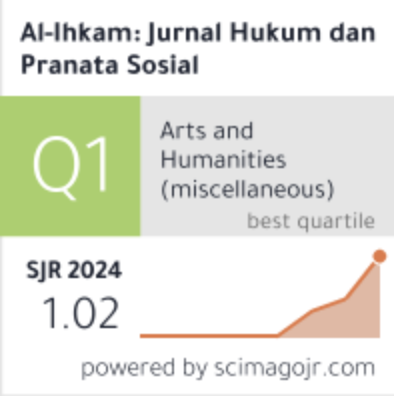Smoking, Hijab and Gender Identity: Social Jurisprudence Perspective on Indonesian Muslim Women in Café Bars
 Abstract views: 1289
,
Abstract views: 1289
,
 PDF downloads: 471
PDF downloads: 471
Abstract
Indonesian Ulema Council (MUI) in 2009 declared that smoking is ḥarām for women, and children, or when held in public places. However, these practices still happen now. It triggers researchers to explore; how the wider social environment regulates the process of internalization and normalization of smoking among Muslim women and the uninvited norms that are religious and social; how religion, gender, and socio-cultural relations shape the attitudes and behavior of Muslim women smoking, and; how social jurisprudence views those problems. This study uses a qualitative approach, which includes observation, interviews, and a literature review with descriptive analysis that considers the principles of social jurisprudence in socio-religious relations. Conducted with an interpretive qualitative paradigm and from a phenomenological epistemology, the study employs the habitus theory by Pierre Bourdieu as well as agency, piety, and embodiment by Eva F. Nisa to explore the intersectionality of faith, culture, and individual agency. Five Muslim women interviewed from five different provinces of Indonesia show how religious ideals clash with gender norms and modernity. The study indicates that familial factors, peers, and media socialization overshadow religious prohibitions against smoking. People adjust religious teachings to specific situations in the way they want since they do not wish the fatwa to control their lives. The café bar is a counter space where women perform defiance and assert ethnic otherness while adhering to patriarchal and religious expectations. Tobacco advertising, in particular, relates views of smoking to economic factors that also contribute to the associated stereotypes of modernity and freedom.
Downloads
References
Anisa, Zahratu Mutiara, Bunyamin Faisal, Pepi Siti Paturohmah, Islam Negeri, Sunan Gunung, and Djati Bandung. “The Image of Muslim Women in Tv Series We Are Lady Parts (2021)” 3, no. 2 (2024): 96–108.
Arifeen, Shehla R. “British Muslim Women ’ s Experience of the Networking Practice of Happy Hours,” 2013. https://doi.org/10.1108/ER-04-2018-0110.
Barraclough, Simon. “[Demostración de Escafandrismo]. 2.” Tobacco Control 8 (1999): 327–32.
Bourdieu, Pierre, and Lois Mcnay. “Culture & Society,” 1999. https://doi.org/10.1177/026327699016001007.
Fair, Ls. “Muslims in Denmark: Discourse of the Veil.” Middle States Geographer 36 (2003): 15–24.
Fithria, Fithria, Muhammad Adlim, Syarifah Rauzatul Jannah, and Teuku Tahlil. “Indonesian Adolescents ’ Perspectives on Smoking Habits : A Qualitative Study,” 2021, 1–8.
Grusendorf, Stephen, and Capital Seminary. “Bourdieu ’ s Field , Capital , and Habitus in Religion” 6, no. 1 (n.d.): 1–13.
H.G., Koenig, George L.K., Cohen H.J., Hays J.C., Larson D.B., and Blazer D.G. “The Relationship between Religious Activities and Cigarette Smoking in Older Adults.” Journals of Gerontology - Series A Biological Sciences and Medical Sciences 53, no. 6 (1998): M426–34. http://www.embase.com/search/results?subaction=viewrecord&from=export&id=L28524561%0Ahttp://dx.doi.org/10.1093/gerona/53A.6.M426.
Harjito, Harjito, Nazla Maharani Umaya, and Muhajir Muhajir. “Indonesian Labor Women (Tkw) Habitus and Agency.” Kafa`ah: Journal of Gender Studies 8, no. 1 (2018): 15. https://doi.org/10.15548/jk.v1i1.194.
Ihsan, Muhammad. “Merokok Dalam Perspektif Muhammadiyah Dan Nahdhatul Ulama.” Al-Qadha : Jurnal Hukum Islam Dan Perundang-Undangan 4, no. 1 (2017): 16–33. https://doi.org/10.32505/qadha.v4i1.174.
“Insaniyat,” n.d.
Islam, Fakir M.Amirul, and Alexandra Walton. “Tobacco Smoking and Use of Smokeless Tobacco and Their Association with Psychological Distress and Other Factors in a Rural District in Bangladesh: A Cross-Sectional Study.” Journal of Environmental and Public Health 2019 (2019). https://doi.org/10.1155/2019/1424592.
Islam, Universitas, Negeri Sunan, Kalijaga Yogyakarta, and Info Artikel. “JILBAB AS AN ACCESSORY IN THE MODERN ERA AND HIS VIEW” 2 (2022): 94–101.
Izharuddin, Alicia. “The Muslim Woman in Indonesian Cinema and the Face Veil As ‘Other’’.’” Indonesia and the Malay World 43, no. 127 (2015): 397–412. https://doi.org/10.1080/13639811.2015.1033162.
Junainah, A, Sharifah Munirah S E, Mohd Said N, and Hanida Hani M M. “Religiosity and Its Relationship with Smoking Cessation : A Systematic Review” 20, no. 4 (2021): 85–94.
Lim, Carmen C W, Brienna Rutherford, Coral Gartner, Caitlin Mcclure-thomas, Shaun Foo, Fang-yi Su, Roman Scheurer, et al. “A Systematic Review of Second-Hand Smoking Mass Media Campaigns ( 2002 – 2022 ),” 2024, 1–12.
Marpaung, Watni, Muhammad A Adly, Rustam Rustam, Akmaluddin Syahputra, Putra A Siregar, Syahrial Arif Hutagalung, Muhammad S A Nasution, et al. “Worshippers Smoking in Mosques : Violation of Fatwas of Ulemas and Governor Regulation,” 2022, 1–9.
Mir, Shabana. ““ I Didn ’ t Want to Have That Outcast Belief about Alcohol ”: Muslim Women Encounter,” n.d., 209–30.
Nasution, Muhammad Zaid Anshari, and Dhiauddin Tanjung. “Kontroversi Hukum Merokok: Perspektif Muhammadiyah Dan Nadhatul Ulama.” Ahlana: Jurnal Hukum Dan Hukum Keluarga Islam 1, no. 1 (2024): 0.
Nisa, Eva F. Face-Veiled Women in Contemporary Indonesia. Face-Veiled Women in Contemporary Indonesia. Routledge, 2022. https://doi.org/10.4324/9781003246442.
Purkon, Arip, Syarif Hidayatullah State, and Arip Purkon. “Rethinking of Contemporary Islamic Law Methodology : Critical Study of Muhammad Shahrūr ’ s Thinking on Islamic Law Sources,” 2001, 1–7.
Putri, Tyas Aisyah, Devy Riyanti, and Adi Wijaya. “Perilaku Dan Promosi Kesehatan : Indonesian Journal of Health Promotion and Behavior Peran Teman Sebaya Dalam Menurunkan Perilaku Merokok Pada Remaja Perempuan Di Kota Yogyakarta Peran Teman Sebaya Dalam Menurunkan Perilaku Merokok Pada Remaja Perempuan D” 6, no. 1 (2024). https://doi.org/10.47034/ppk.v6i1.1082.
Salafi, All. “Cadari as Dedicated Actors,” 2011. https://doi.org/10.4324/9781003246442-7.
Studies, Islamic, and Jurnal Enlekturer. “ENLEKTURER: Journal Islamic” 1, no. 1 (2023): 67–90.
Supadmi, Sri, Hadi Ashar, Ina Kusrini, Sidiq Purwoko, and Marizka Khairunnisa. “The Risk of Women Smokers against Birth Weight in Urban Rural Indonesia” 11 (2023).
Taylor, Gemma M J, Assistant Katherine Sawyer, Assistant David Kessler, Marcus R Munafò, Paul Aveyard Frcgp, and Alison Shaw. “Views about Integrating Smoking Cessation Treatment within Psychological Services for Patients with Common Mental Illness : A Multi-Perspective Qualitative Study,” no. July 2020 (2021): 411–20. https://doi.org/10.1111/hex.13182.
Trosclair, Angela, and Shanta R. Dube. “Smoking among Adults Reporting Lifetime Depression, Anxiety, Anxiety with Depression, and Major Depressive Episode, United States, 2005-2006.” Addictive Behaviors 35, no. 5 (2010): 438–43. https://doi.org/10.1016/j.addbeh.2009.12.011.
Turmudzi, Khoiru, Noni Sherlya, Yasmin Ramadhani, Alvin Faiz Rusdian, and Nauval Karim. “Exploring The Epistemological Basis of Ushul Fiqh ( Priority Fiqh By Yusuf Al-Qardawi ),” no. 2 (2025): 1–20.
Widyaningrum, Nurul, and Jiang Yu. “Tobacco Use Among the Adult Muslim Population in Indonesia : A Preliminary Study on Religion , Cultural , and Socioeconomic Factors,” 2018, 1–13. https://doi.org/10.1177/0022042618789491.
Zain, Muhammad. “No Title” 7, no. 3 (2023): 1661–81. https://doi.org/10.22373/sjhk.v7i3.19383.
Copyright (c) 2025 AL-IHKAM: Jurnal Hukum & Pranata Sosial

This work is licensed under a Creative Commons Attribution-ShareAlike 4.0 International License.
In order to be accepted and published by Al-Ihkam: Jurnal Hukum dan Pranata Sosial, author(s) submitting the article manuscript should complete all the review stages. By submitting the manuscript, the author(s) agreed to the following terms:
- The copyright of received articles shall be assigned to Al-Ihkam: Jurnal Hukum dan Pranata Sosial as the publisher of the journal. The intended copyright includes the right to publish articles in various forms (including reprints). Al-Ihkam: Jurnal Hukum dan Pranata Sosial maintain the publishing rights to the published articles.
- Authors are permitted to disseminate published articles by sharing the link/DOI of the article at Al-Ihkam: Jurnal Hukum dan Pranata Sosial. Authors are allowed to use their articles for any legal purposes deemed necessary without written permission from Al-Ihkam: Jurnal Hukum dan Pranata Sosial with an acknowledgment of initial publication to this journal.
- Users/public use of this website will be licensed to CC-BY-SA.



.png)
_1.png)


_page-00011.jpg)


